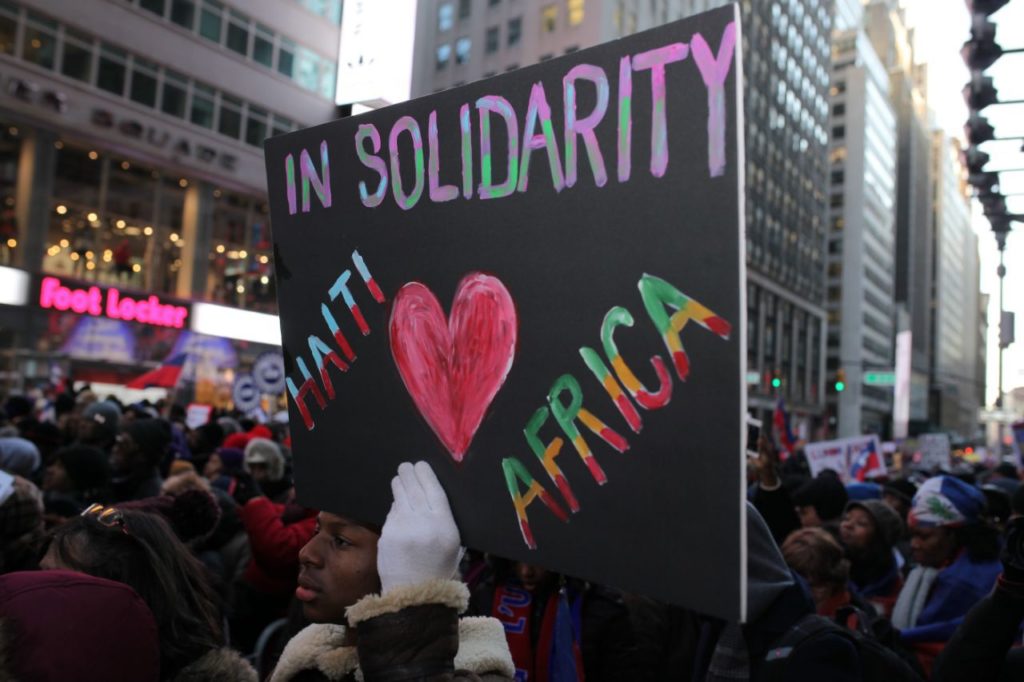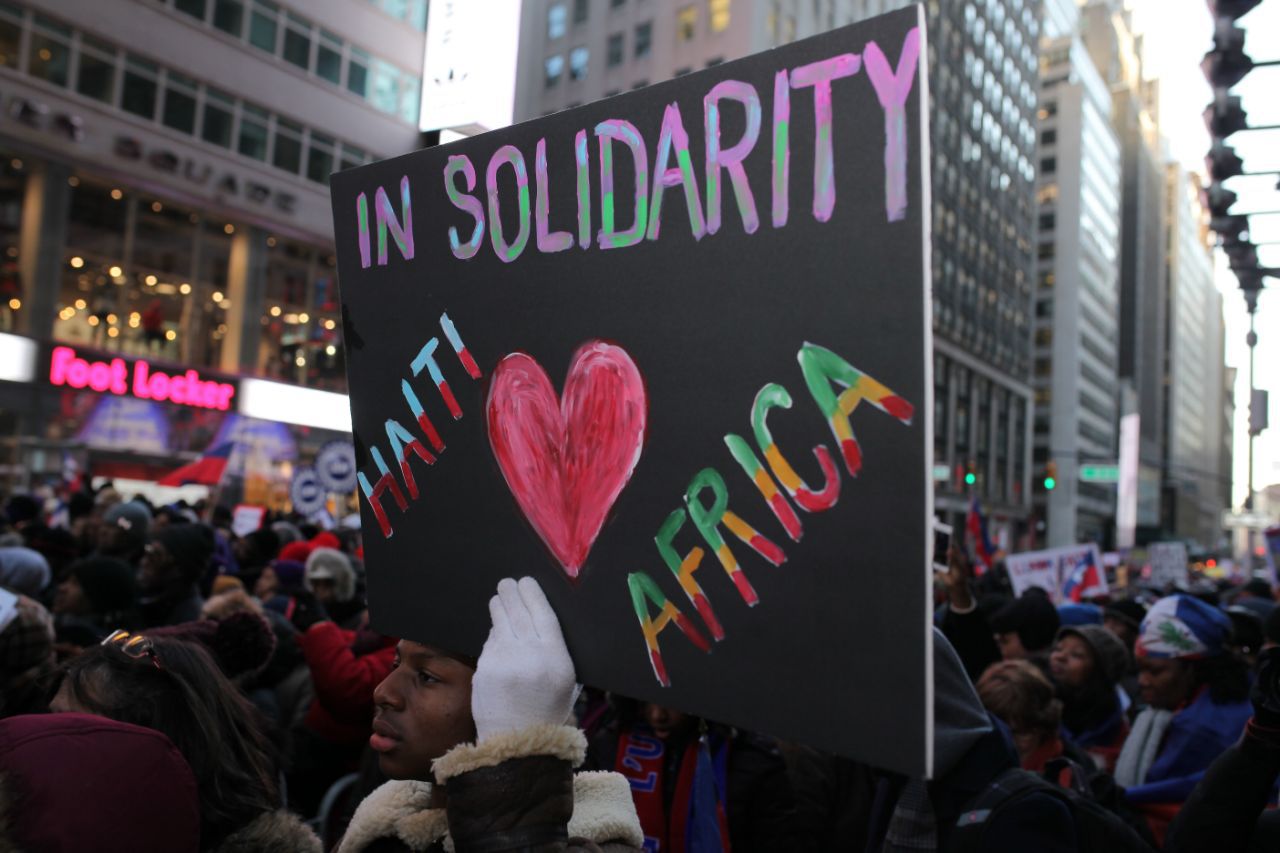A guest post by Marie-Rose Romain Murphy
The Oxfam scandal has generated much press coverage over the past two weeks, with a good amount of sensationalism. The focus has been positively titillating and hashtag-able: prostitutes, #metoo, sexual harassment, rapes, #aidtoo.
Besides rare mentions, the voices have been from Global North practitioners and policymakers. On February 13, I had a brief interview with the BBC about the scandal. As the President of a Haitian-led organization, I appeared on a panel with two other British women – one academic, the other with a social services background. The question (and the only question) that was posed to me was,
“How angry are you about what happened in Haiti?”
What?!
“I’m certainly not happy about it…” I replied, bewildered and annoyed. I recovered and went on to say that Oxfam is taking a beating, but the issues are systemic. Imbalances of power lead to abuses of power.
Our context in Haiti is dominated by international organizations. Bilateral, multilateral, and large international NGOs come into Haiti, often with budgets larger than state agencies, as well as political connections. They command a lot of power.
The host followed with, “You mean, it’s much wider than Oxfam?” to which I answered,
“Yes, it is wider than Oxfam.”
I sent an update about the interview to members of my network, and was surprised by the heartfelt responses from many national-level organizations’ leaders in Kenya, Somalia, and elsewhere.
“That’s sooooo true!!!” said one of them known for her low key and dignified persona.
Another dynamic leader from Africa stressed the need to write about, “this issue [of imbalances of power] and the system of marginalization of local people at all levels.”
One leader from Haiti went on to say: “What bothers me is that the scandal is like a movement linked to sensationalism, rather than addressing those victimized.”

The reality is that in Haiti, and in many other countries around the world, the Oxfam scandal is not a surprise. It doesn’t even warrant much attention. We’ve been all too familiar with these issues.
We’ve complained about them for decades and haven’t gotten heard until western journalists chose to cover a few stories. In fact, in the Oxfam scandal, the western media talk about “sex workers and prostitutes.” We know that the young girls and women involved were probably, for the most part, ordinary girls and women operating in a survival mode.
I will tell you why the #Oxfamscandal shouldn’t be “the focus” of our energies any longer. Having had many conversations with Global South colleagues from all over the world involved in humanitarian and development work for the past decade, I can tell you that this incident wasn’t the first. It will not be the last. These scandals are just symptoms.
Both in the global development and the humanitarian fields, local and national organizations of the Global South get a miniscule percentage of the aid funds (less than 1%). It doesn’t matter how much donors and large institutions talk about their commitment to local leaderships, most do not “walk their talk.” Local and national organizations’ expertise and intrinsic value are discounted.
Development as we define it, on our terms, is not really supported in ways that count (access to solid funding, adequate overhead allocations, etc). We are told that we cannot access funds because of our “lack of capacity,” but there doesn’t seem to be adequate support for the effective reinforcement of our capacity. What a Catch 22!
We hear that donors have “issues” dealing directly Global South organizations. What the specific issues are and recommendations on addressing them remain to be clearly stated. In brief, the Aid framework needs structural change, a fundamental transformation. Its approach remains problematic if it continues to operate under the assumption that aid recipients (countries or individuals) are in a position where they need help, cannot be fully trusted to understand their issues, nor can they devise effective solutions for their problems.
Haiti is a perfect case for the need to change the paradigm of development and international aid. Three years after the 2010 earthquake, only 0.6% of the billions of public and private monies given to Haiti had gone directly to Haitian organizations and Haitian businesses. Our development context is ridiculously dominated and controlled by International NGOs and international institutions. Worse still, we are not at the table for discussions that impact our future. Decisions regarding our development are made in New York, Washington, Geneva, London…
In Haiti, we need systems of strong governance, accountability, leadership, and empowerment of local communities. These systems are not by any means the sole responsibility of international institutions. On the contrary, as Pierre-Marie Boisson, Sr. Vice President of Haiti’s Sogebank and an economist, stresses,
“We, in Haiti, have a history of bad governance and a need for a structured society with a solid system of checks and balances.”
The Haiti Community Foundation Initiative has been building a Haiti-based, Haiti-led community foundation structured as a national network of regional funds. We construct models of community-led development where local leaders can reclaim the leadership of our communities and of our country. Having done it in the Grand’Anse, our pilot region, we know that it works!
So here’s how I could have also responded to that BBC reporter, even more clearly:
As many of us continue to advocate for our country’s and community’s right to self-determination, we have experienced a range of emotion – from anger, rage, and frustration, to depression, grief, and deep sadness – elicited by the very real barriers to social change put in place by the status quo. In the larger scheme of things, the Oxfam scandal doesn’t matter. Really, it doesn’t.
But make no mistake. We are very clear about what the core issues are, i.e. a system of power imbalances – a do-gooder industry built on them – that too often abuses us and marginalizes our peoples at all levels.
Until these urgent injustices are honestly and earnestly addressed by Global North and Global South stakeholders, in Haiti and beyond, the UN troops, Red Cross, Oxfam, and other scandals will only continue to unfold.
 Born and raised in Haiti, Marie-Rose Romain Murphy is a humanitarian and development practitioner and the Co-Founder of Fondation Communautaire Haitienne-Espwa, otherwise known as the Haiti Community Foundation. (Espwa means “hope” in Haitian Creole.) For more information, contact info [at] espwa-haiti.org.
Born and raised in Haiti, Marie-Rose Romain Murphy is a humanitarian and development practitioner and the Co-Founder of Fondation Communautaire Haitienne-Espwa, otherwise known as the Haiti Community Foundation. (Espwa means “hope” in Haitian Creole.) For more information, contact info [at] espwa-haiti.org.
***
Related Posts
Does aid need a 12-step program?
White supremacy, black liberation, and global development: The conversations we’re not having
How NOT to respond to bad press: Thoughts for my fellow aid workers (and former colleagues)
What’s so “risky” about funding at the grassroots level?
A new kind of donor: 4 things they do differently
Hot money or cold money?
Causing ripples through the layers of DC aid bureaucracy
When an international NGO plans its obsolescence
Building a Fire: Thinking twice about how we look at organizational capacity assessment
Capillary Philanthropy: Businesses, local NGOs, and the future of aid


I agree with much of what your state.
Please see some rather more detailed comments I made on this on this at “https://www.linkedin.com/pulse/oxfam-its-time-face-music-louise-terry/?trackingId=Y2RjCj7oKAuarYzjOSTegA%3D%3D” supporting your view that this is both wider than OXFAM, but it it is also a wider issue of abuse of power and privilege, with as you say a dimension of sex and titillation though is not representative of the wider symptoms and issues. It is just the tip of an iceberg, a small aspect of the elephant in the room.
I am not diminishing for one second either the gravity of individual and management abuses (of any nature), nor the the amazing and positive efforts and impacts of the many often unseen humanitarian individuals and organisations of professionalism and integrity.
What is overdue is a holistic and constructive debate, NOT ONLY focusing on OXFAM, nor on sexual abuses of power, nor solely on the negative aspects of aid) but on (a) the wider malaise in the aid sector, (b) why nothing has been done sooner despite much of the shortcomings being known and even documented in earlier aid responses (even documented by donors & aid institutions) and (c) was it purely coincidental that it took specifically sexual / gender related abuses of power in a predominantly Christian disaster response (Haiti) to trigger this international indignation and seemingly “me-too-moment” in humanitarian aid [as opposed to the other types of abuses also, so frequently occurring across the full spectrum of ethnic, cultural, religious and geographic aid responses].
Well said! I agree 100%. I hope your voice and others like yours need to be heard among the Western dominated narrative.
Thank you for the important comments relating to this issue of abuse of power and privilege. I will add another dimension to the image voiced in the article and the comments. It is the creation of a new “elite” in poor countries like Haiti. The world of NGOs in Haiti counts thousands of service provider organization that are independently creating their own class. I infer a new elite with an income level superior to that of the professional local worker in comparison; supporting an economy of service (chauffeur, restaurant, house maid, rental space, landlord). They are preferred by the notion of their disposable income even when they have limited experience to bring new and creative strategies to the locality where they serve.
This displaces employment potential for many and local workers are often victim of discrimination based on employment, promotion and relative strategic solutions.
It is also this disparity that further the “brain drain” where many able young men and women are migrating out of the country for lack of opportunity and lack of hope for a better future at home.
The new elite guarantee the continuation of poverty standards even among those who are prepared with a level of preparation and education that could lead them out of poverty.
Thank you for the article. Sitting in Swaziland Southern Africa one wonders really what we can do with the issue of aid. I see a lot of “You cannot bite the hand that feeds you.” We suffer in silence because we are totally unequivocally dependent on aid. When we do our budget speeches the bulk of the revenue is from development partners (as we call them). Unfortunately, we take that aid totally in the terms of the giver and we remain disempowered and helpless without the donor. Do we have the guts to address the violations of people’s rights, NO, because that’s where we make our livelihoods. Some of our officials would rather focus on stomach politics with a lot of meaningless travels that only satisfy the stomach of the traveler. I’ve said it before, management and leadership positions are not localized and there’s little or attempt for succession planning with an intent to create sustainability. We find ourselves always at the mercy of the giver. The power dynamics narrative needs a paradigm shift, but we cannot get that from those that are enjoying the benefits directly.
I totally agree that aid needs to be restructured not in favor of the giver but also consider that it must be people driven therefore, they should be at the centre of the any development venture including ascertaining the terms of the very aid. If we continue to negotiate from NYC, London, etc. we are still going to see worse than what we have seen in Haiti.
You could not have said it any truer than you have. However, not every giver does it with ultra vire motives.
The ‘Aid’ system needs a complete overhaul by the giver themselves. By system here I mean the tools, time, methods, people involved between the giver and recipient (both ends included).
People have not brought out the vices before, because that is the hand that serves and finger that feeds them as the saying goes. But that should not be a defence for exploitation.
The Oxfam-Haiti scandal has been well addressed above. Oxfam should not be the sacrifical lamb for other organizations. The world misses the other organizations injustices because the are dressed in different coats.
From my experience, i have found that the intermediaries are the ones who twist the minds and arms of givers by making the aid inaccessible by the populations that need it under the guise of ‘ lacking capacity’. Yet they will not develop your capacity for fear that you will know and do more than them making them irrelevant in the system. If one speaks out, the intermediaries, concoct all manner of false accusations against you and have you blacklisted on the future aid recipient list.
This is common in 99 out of 100 donor-aid organizations; and worst in the ones using the federated approach of funding. The bulk of funding in administrative costs is used by these ‘know-it-all’ intermediaries leaving the purposed recipients with very little – I call this ‘Mother bird feeding babies’ method. One opens their mouths to receive without questioning or seal your mouth and never gramble.